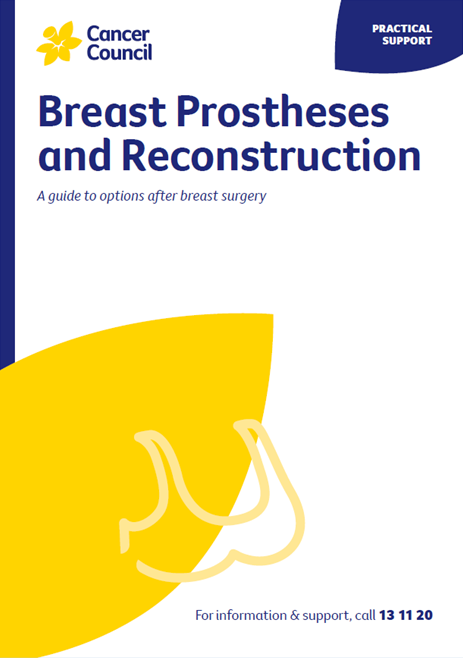- Home
- About Cancer
- Managing side effects
- Breast prostheses and reconstruction
- Breast reconstruction
- Implant reconstruction
- Risks of having an implant reconstruction
Risks of having an implant reconstruction
Before the operation, the surgeon will discuss the risks of an implant reconstruction with you. Some of these risks are covered below.
Learn more about:
- Infection
- Implant rupture
- Hardening of the implant
- Movement
- Visible rippling
- Lymphoma
- Other health problems
Infection
You’ll be given antibiotics at the time of the operation to reduce the risk of infection. If you do get an infection, the implant may have to be removed until the infection clears. The implant can then be replaced with a new one.
Implant rupture
Implants can leak or break (rupture) because the silicone gradually weakens over time. If a saline implant ruptures, salty water will leak into your body. The salty water is not harmful, but you will need to have surgery to remove the empty silicone envelope and replace the implant.
Implants may need to be changed every 10–15 years, or earlier if there are any problems. Regularly examine your breasts, armpit and implant for any changes. See your surgeon or GP every year for check-ups, which will include scans.
Hardening of the implant
A fibrous covering can form around a breast implant. If this hardens over time, it may make the reconstructed breast feel firm. This is called capsular contracture, and it is more common after radiation therapy.
Capsular contracture can be uncomfortable or painful and may change the shape of the breast. You may need to have additional surgery to remove or replace the implant. A new surgical procedure called capsulotomy can be done to loosen the scar tissue surrounding the implant.
Movement
The position of the implant in the body may change slightly over time. This is called implant malposition, displacement, descent or rotation. In a small number of cases, the implant shifts a lot and changes the shape of the breast. Further surgery can restore the implant to its original position.
Visible rippling
Sometimes implants adhere to the surface of the skin and this can affect how smooth the breast is. This can often be corrected with minor surgery, which injects fat from another part of the body under the skin. This is called lipomodelling.
Lymphoma
There have been reports of a link between a type of non-Hodgkin lymphoma and textured breast implants. This is known as breast implant associated anaplastic large cell lymphoma, or BIA–ALCL, and it is rare. BIA–ALCL is a cancer that grows in the fluid and scar tissue that forms around a breast implant. Implants that have a smooth surface have not been linked to BIA–ALCL. The Therapeutic Goods Administration (TGA) recommends monitoring your breasts for any changes such as swelling, a lump or pain.
For more information about BIA–ALCL, visit the TGA’s website at tga.gov.au and search “BIA–ALCL for consumers”. The TGA also has an online breast implant hub, where information and support related to breast implants and their safety are updated as new evidence becomes available (visit tga.gov.au/hubs/breast-implants). If you are concerned, talk to your surgeon.
Other health problems
Research has not established that silicone breast implants cause autoimmune disorders such as scleroderma, rheumatoid arthritis or lupus. There is also no evidence that implants cause breast cancer.
Learn more about the safety of breast implants and the side effects that may occur after breast surgery.
→ READ MORE: How to keep up to date about the safety of your breast implants
Podcast for people affected by cancer
Listen now
More resources
Dr Jane O’Brien, Specialist Oncoplastic Breast Cancer Surgeon, St Vincent’s Private Hospital, VIC; Clare Bradshaw, Clinical Nurse Consultant, Breast Assessment Unit, Fiona Stanley Hospital, WA; Rene Hahn, Consumer; Sinead Hanley, Consumer; Dr Marc Langbart, Specialist Plastic and Reconstructive Surgeon, Randwick Plastic Surgery, NSW; Melanie Law, Consumer; Sally Levy, Consumer; Annmaree Mitchell, Consumer; Ashleigh Mondolo, Breast Cancer Nurse Clinical Consultant, Mater Private Hospital Brisbane, QLD; Rochelle Osgood, Clinical Nurse Consultant – McGrath Breast Care Nurse, Sunshine Coast University Hospital, QLD: Dr Kallyani Ponniah, Head of Department, Breast Centre, Sir Charles Gairdner Hospital, WA; Meg Rynderman OAM, Consumer; Sarah Stewart, Breast Care Nurse, The Royal Women’s Hospital, VIC; Erin Tidball, 13 11 20 Consultant, Cancer Council NSW; Jane Turner, Senior Exercise Physiologist, Sydney Cancer Survivorship Centre, Concord Cancer Centre, NSW.
View the Cancer Council NSW editorial policy.
View all publications or call 13 11 20 for free printed copies.

